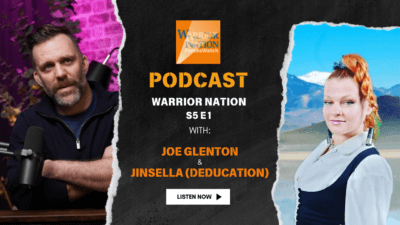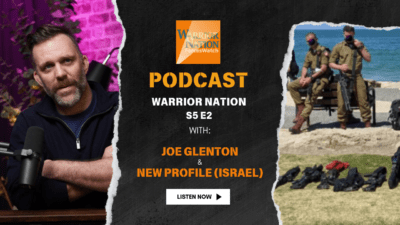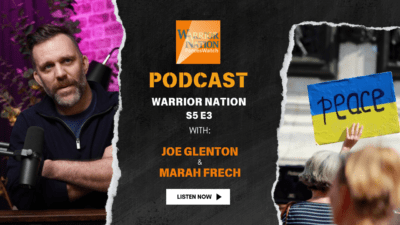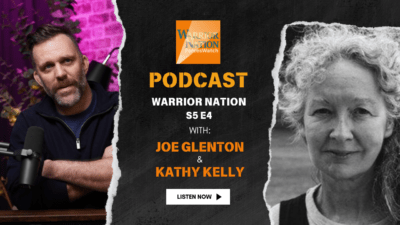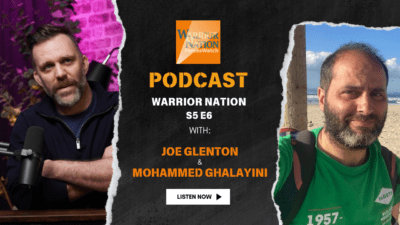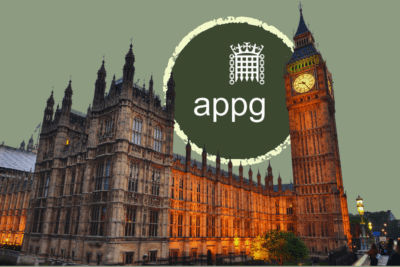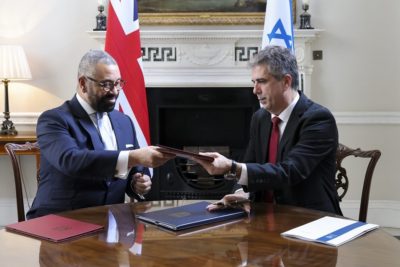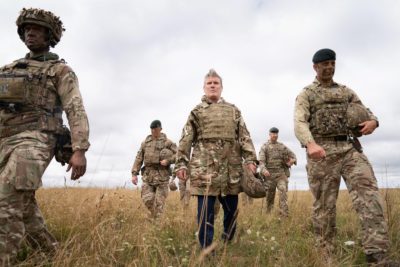International antimilitarism
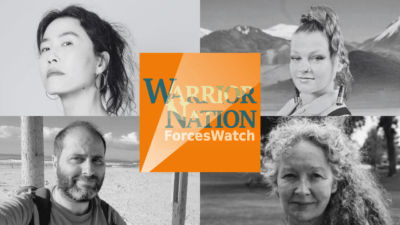
We’ve finished Series 5 of the Warrior Nation podcast. It’s hard to believe what started in a back shed at our offices has covered such a range of topics. From public memorialising of the military to the martial nature of policing, from drone warfare through to the role of art in resisting militarism.
The latest 6-episode series covers international antimilitarism and we wanted to take the chance to reflect on what we learned from our guests this time round.
Episode one – Demilitarising Education
Back in February we spoke to Demilitarise Education’s Jinsella Kennaway. For a number of years now dED have been working in universities to counter the presence of arms firms in education. We had a great discussion about strategy, tactics, efficiency and organizing; one which anybody could stand to learn from.
“We have to understand that hope is our greatest superpower. We have to reclaim the power of education so it can advance the world into a sustainable utopia that we all want to live in.”
You can listen to EP1 here.
Episode two – militarism & patriarchy in Israel
In March we spoke to Or, an activist and objector from the Israeli organisation New Profile. We learned that Israel is one of the profoundly militarised countries in the world, with terrifying impacts for occupied Palestinians, as well as Israelis. We asked how New Profile supports war resisters in a nation which considers itself permanently at war. Other topics include government repression and the cultural and therapeutic implications of war.
“Our feminism talks about equal in what? In killing people? In destroying peoples lives? In occupying?
That’s not equality. We don’t want equality in destroying other peoples lives… The whole concept of war and military are based on patriarchy”
You can catch up here.
Episode three – Ukrainian war resisters
Russia’s invasion of Ukraine has had multiple global impacts. From the rise in global food and oil prices to the increased threat of nuclear war, it’s hard to find hope. But many thousands of Ukrainians, Russians and Belorussians have refused to engage in the fighting, fleeing to Europe to avoid the draft.
We spoke to Marah Frech, board member of Connection, a German anti-militarist group which supports deserters and resisters. We explore this new front of struggle which encompasses contemporary debates on war, migration and asylum.
“They are done with the war they’ve been fighting for the last 18 months… They are traumatised. They’re injured. They have war tremors or they tremble when they speak. If they are still in Ukraine, they have to find a way out of Ukraine, but they are not allowed to do so because its almost always men that are not allowed to leave the country.”
Hear the full story here.
Episode four – anti-militarism & international solidarity with Kathy Kelly
At the end of march we spoke to renowned American peace activist Kathy Kelly. Kathy is a founding member of Voices in the Wilderness, and, until the campaign closed in 2020, a co-coordinator of Voices for Creative Nonviolence. As part of peace team work in several countries, she has traveled to Iraq twenty-six times, notably remaining in combat zones during the early days of both US–Iraq wars.
Her recent activism has focused on Afghanistan, Yemen, Gaza and US drone policy. She has been arrested more than sixty times, and written of her experiences among targets of US military bombardment and inmates of US prisons. She joined us in mid-March, ahead of the UN ceasefire vote.
“Gaza may be a portal, we may be at a tipping point that I’ve never seen in my life. I was deeply distressed by the United States plans to go to war in Iraq… But this is different.”
You can catch up on our chat with Kathy here.
Episode five – neocolonialism in South Korea
As well as wars in Gaza and Ukraine, tensions in the Asia-Pacific continue to threaten. Not least in the Korean peninsula, where the US military have long maintained a colonial presence.
We spoke to Jungmin Choi from the South Korea-based anti-militarist campaign group World Without War about her work. Our conversation touched on gender, US military bases, how the stand-off with North Korea is used to support militarist arguments and the military industry, how to sustain yourself during difficult campaigns and the implications of neocolonialism.
“It’s really odd to say ‘Well, it’s okay to object to military service now because the current South Korean military is essentially a subsidiary of the United States’. But [also think that] once unification is achieved and foreign forces withdraw, you shouldn’t object to military service.”
Hear Jungmin here.
Episode six – life, art and loss in the Palestinian diaspora
Having covered conflicts in Ukraine, Israel and Asia, we sought out a voice from the Palestinian diaspora to address the experience of occupation.
British-Palestinian poet and scientist Mohammed Ghalayini spent the first two months of Israel’s assault on Gaza inside the besieged enclave. He told us about art and life in the diaspora, growing up in exile and his time spent in Palestine. We also discussed the threat of autonomous weapons, UK and US support for Israel, the deadly effects of war and militarism on the environment and why it’s a mistake to think the Israeli occupation doesn’t concern you.
“It might not affect you today but it will affect you tomorrow. First they came for the Palestinians. If you don’t stand up now, they will come for you after that”
Listen to Mohammed’s story here.
What’s next for Warrior Nation?
We hope you enjoy these episodes. And that you’ll dip into our back catalogue too. We’re already planning our next season, so keep an eye out for updates. Without wanting to give too much away, we can say that series 6 will have an eye on the future. In the meantime you can become a podcast supporter via our Warrior Nation page.
See more: military in society, Warrior Nation
Like what you read?
> Sign up for our newsletter or blog notifications
> Support our work – from just £2 a month

